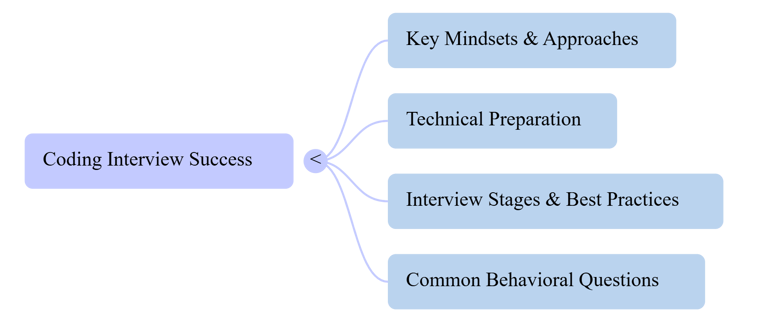Preparing for a software development interview is about more than just coding. It involves a blend of technical knowledge, communication skills, and a confident mindset. This cheatsheet outlines key areas to focus on before your interview to maximize your chances of success.
1. Cultivate the Right Mindset and Confidence
Your performance on interview day is significantly influenced by your thoughts beforehand.
Back Yourself: Combat imposter syndrome, self-doubt, and lack of confidence by telling yourself you've got this and will present yourself exceptionally well.
Positive Self-Talk: Prime your mind by focusing on positive thoughts. Recall past successes and embody that emotion of satisfaction. Research indicates positive self-talk improves performance and self-confidence.
Embrace the "Expert Approach": Visualize yourself as an expert with the skills and requirements the company needs. See the hiring manager as a new client you're exploring, and be ready to articulate how your expertise can add value, change processes, or improve their business.
Manage Nerves: It's normal to feel nervous. Learning to manage these feelings is essential for performing well.
2. Master General Knowledge and Development Methodologies
Beyond specific coding languages, interviewers look for a broader understanding of the software development landscape.
Development Methodologies (e.g., Agile, Scrum): Be familiar with organizational methods meant to make teams effective. It's expected to have expertise in them.
Capacity for Criticism and Opinion: Don't just agree with everything; form your own opinions about industry-wide tools and development methodologies, and be prepared to back them up with reasons. Interviewers seek developers who can offer solutions or alternatives, not just follow instructions.
Willingness to Learn: General knowledge helps you form better opinions and demonstrates a willingness to learn outside your immediate field. Read up on topics and form your own opinions.
3. Deeply Understand Your Chosen Language and Design Patterns
Knowing your programming language well and understanding software design principles are crucial for standing out.
Learn One Language Well: If you're starting out, choose one language (like JavaScript or Python) and learn it thoroughly.
Know Its Quirks: Go in-depth with your chosen language, learning its specific behaviors and underlying mechanisms. Books often provide a deeper understanding than online courses.
Study Design Patterns: Learn about design patterns relevant to your language or programming in general. While you don't need to memorize or implement all of them, familiarity and the ability to implement a few will allow you to engage in technical conversations and express informed opinions.
4. Sharpen Your Coding Skills
While communication and mindset are important, strong coding skills remain fundamental.
Practice Algorithms and Data Structures: This is a core part of technical interviews. The interviewer will assess your ability to apply these concepts.
Use Platforms like LeetCode: Practicing on platforms like LeetCode is highly recommended. It helps you discover interesting math curiosities, patterns, and optimizations. This is also the best way to train your ability to brainstorm data structures and algorithms.
Understand Time and Space Complexity: Be prepared to discuss the time and space complexity (Big O, Big Omega, Big Theta notations) of algorithms. Understand common complexities like O(1), O(log n), O(n), O(n^2), etc..
5. Prepare for Behavioral Questions and Showcase Your Attitude
Companies often prioritize good people who are teachable and have a positive attitude, sometimes even over "great programmers".
"Tell Me About Yourself": Prepare a brief (30-60 seconds) introduction summarizing your education, work experience, and interests relevant to the role. Keep it concise and impactful.
"Why This Company?": Do your research thoroughly. Understand the company's goals and how your goals and interests align with them. Reading their tech blog can help you formulate insightful questions.
"What Are You Looking For?": Be clear about your career goals and what you seek in your next role (e.g., mentorship, learning opportunities, specific technical expertise).
Self-Awareness & Coachability: Be ready to discuss areas of weakness you are actively working on. This demonstrates self-awareness and your capacity for growth.
Positive Attitude: Avoid being vain or creating "bad vibes". Companies look for "great humans" and value traits like honesty and eagerness to learn. A bad attitude or lying can lead to immediate elimination.
6. Logistics and Final Questions
Practical preparations ensure a smooth interview experience.
Dress Comfortably: Usually, casual attire (T-shirts and jeans) is acceptable.
Prepare Your Environment (Virtual Interviews): Ensure you have pen and paper for notes and visualizations, use earphones/headphones in a quiet environment, and check your internet connection, webcam, and audio. Familiarize yourself with shortcuts in the coding environment.
Prepare Questions to Ask: Have a list of thoughtful questions ready for the interviewer about their work, company culture, challenges, and daily life. This shows your interest and allows you to "interview" them to see if the company is a good fit for you. Not asking questions, or asking uninspired ones, can send a bad signal.
Consider Pre-suasion: A unique tip is to ask the interviewer, "Why did you invite me to the interview today? What was it about my application that stood out?" This subtly prompts them to focus on your positive aspects early on.
Interview Cheatsheet: Essential Preparation for Software Developers


Location
Bangalore, India
Karnataka
Copyright
© 2025 CodeTechDevX
All rights reserved
